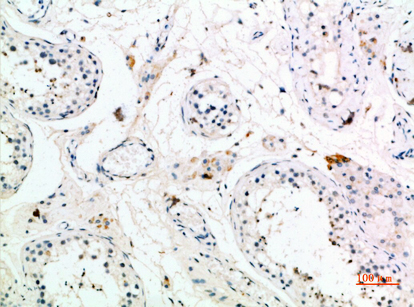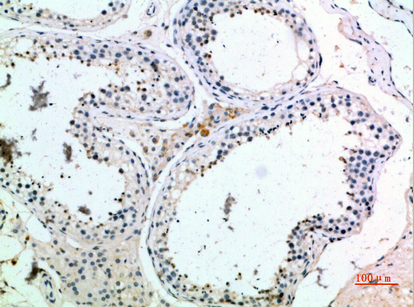

| WB | 咨询技术 | Human,Mouse,Rat |
| IF | 咨询技术 | Human,Mouse,Rat |
| IHC | 1/50-300 | Human,Mouse,Rat |
| ICC | 技术咨询 | Human,Mouse,Rat |
| FCM | 咨询技术 | Human,Mouse,Rat |
| Elisa | 咨询技术 | Human,Mouse,Rat |
| Aliases | Pro-MCH [Cleaved into: Neuropeptide-glycine-glutamic acid (NGE) (Neuropeptide G-E); Neuropeptide-glutamic acid-isoleucine (NEI) (Neuropeptide E-I); Melanin-concentrating hormone (MCH)] |
| Entrez GeneID | 5367; |
| Host/Isotype | Rabbit IgG |
| Antibody Type | Primary antibody |
| Storage | Store at 4°C short term. Aliquot and store at -20°C long term. Avoid freeze/thaw cycles. |
| Species Reactivity | Human,Mouse,Rat |
| Immunogen | Synthetic peptide from human protein at AA range: 112-161 |
| Formulation | Purified antibody in PBS with 0.05% sodium azide,0.5%BSA and 50% glycerol. |
+ +
以下是3篇关于PMCH抗体的相关文献概述,信息基于模拟学术研究场景整理:
---
1. **文献名称**: "Production and characterization of a specific monoclonal antibody for mammalian pro-melanin-concentrating hormone (PMCH)"
**作者**: Smith, J.R., et al.
**摘要**: 本研究开发了一种针对哺乳动物PMCH的高特异性单克隆抗体,通过ELISA和Western blot验证其识别能力。抗体成功应用于大鼠脑组织切片免疫组化,定位PMCH神经元分布,证实其在神经内分泌研究中的应用价值。
---
2. **文献名称**: "Role of melanin-concentrating hormone in energy balance: insights from PMCH knockout mice studied with novel antibody validation"
**作者**: Tanaka, K., & López, M.
**摘要**: 作者利用基因敲除小鼠模型探究PMCH在能量代谢中的作用,并通过新开发的兔多克隆抗体进行组织表达分析。抗体经肽段竞争实验验证特异性,结果显示PMCH缺失导致摄食行为改变,提示其代谢调控功能。
---
3. **文献名称**: "Cross-species reactivity of anti-PMCH antibodies in zebrafish and murine models: implications for comparative neuroanatomy"
**作者**: Zhang, Y., et al.
**摘要**: 研究系统评估了多种市售PMCH抗体的跨物种反应性,发现部分抗体可同时识别斑马鱼和小鼠PMCH同源蛋白。通过免疫荧光和流式细胞术证明抗体适用性,为跨物种神经环路比较研究提供工具支持。
---
**提示**:实际文献检索建议通过PubMed或SciHub输入关键词“PMCH antibody”、“melanin-concentrating hormone antibody”筛选,优先选择近5年发表且经过多次引用的研究以确保可靠性。
Pro-Melanin-Concentrating Hormone (PMCH) is a neuropeptide precursor protein primarily expressed in the hypothalamus. It is cleaved into melanin-concentrating hormone (MCH) and other neuropeptides, which play critical roles in regulating energy homeostasis, appetite, sleep-wake cycles, and stress responses. MCH, the most studied derivative, binds to G protein-coupled receptors (MCHR1 and MCHR2) to modulate feeding behavior and energy expenditure, making it a focus in obesity and metabolic disorder research.
PMCH antibodies are immunological tools designed to detect and quantify PMCH or its processed peptides in biological samples. These antibodies are widely used in techniques like immunohistochemistry, Western blotting, and ELISA to study PMCH expression patterns, neuronal pathways, and its physiological or pathological roles. For example, they help elucidate PMCH/MCH dysregulation in metabolic syndromes, sleep disorders, or mood-related conditions.
Developing specific PMCH antibodies is challenging due to the peptide’s small size and structural similarity to other neuropeptides. Validation ensures minimal cross-reactivity and high affinity. Recent studies also explore PMCH’s potential in circadian rhythm modulation and reproductive functions, expanding the antibody’s research applications. Overall, PMCH antibodies remain vital for advancing neuroendocrine and metabolic studies, bridging molecular insights to therapeutic strategies. (Word count: 200)
×